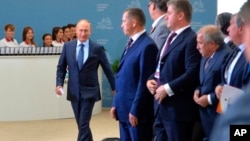President Vladimir Putin says Russia wants to form an international anti-terrorism coalition, and that Syria's president is ready to hold early parliamentary elections and even include members of the opposition in running Syria.
"We really want to create some kind of international coalition to fight terrorism and extremism," Putin said Friday at the Eastern Economic Forum in Vladivostok.
He said his government is “holding consultations with our American partners” on the issue, and he had personally discussed it with President Barack Obama by phone.
The Russian president said he also talked about it with Turkish President Recep Tayyip Erdoğan, the leadership of Saudi Arabia, Jordan’s King Abdullah II and Egyptian President Abdel Fattah el-Sissi, among other leaders.
Putin said steps toward creating such a coalition should run parallel with "certain political processes in Syria itself."
Syrian President Bashar al-Assad, he said, agrees with this and is prepared to hold early parliamentary elections, as well as to establish contacts with "the so-called healthy opposition" and bring them into the government.
Putin said refugees from Syria are fleeing "not from the regime of Bashar Assad," but from the "atrocities" of the Islamic State group.
"But, we understand that political changes are necessary," he added. "We are working with our partners in Syria itself."
Human rights violations
Western governments and human rights groups have accused both Syrian government forces and those of the Islamic State group of large-scale human rights violations.
Putin said it was "premature" to discuss possible Russian involvement in military operations against IS in Syria, but he said Russia is providing Damascus with "very serious support and equipment, and training of military personnel, weapons."
On Thursday, White House spokesman Josh Earnest said Washington is "closely monitoring" reports Moscow has deployed military personnel and aircraft to Syria.
"Any military support to the Assad regime for any purpose, whether it's in the form of military personnel, aircraft supplies, weapons, or funding, is both destabilizing and counterproductive," said Earnest.




